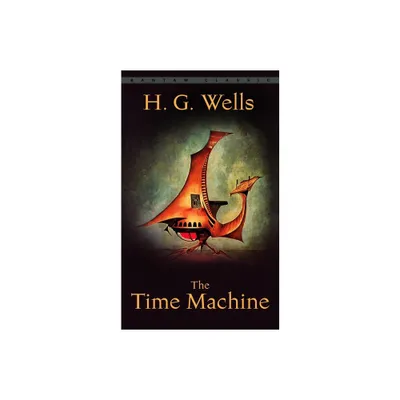Home
The Time Machine
Loading Inventory...
Barnes and Noble
The Time Machine
Current price: $12.99


Barnes and Noble
The Time Machine
Current price: $12.99
Loading Inventory...
Size: OS
*Product Information may vary - to confirm product availability, pricing, and additional information please contact Barnes and Noble
About the Author
Herbert George Wells was born into a decidedly middle-class family on September 21, 1866, in the London borough of Bromley. His father was a tradesman and his mother a Lady’s maid. Central to the experiences of his youth was an acute awareness of class structure that was emphasized by the position of his family in the class-conscious English society of the time.
After a basic education he became a pupil-teacher at the Midhurst Grammar School and secured a scholarship that allowed him to study with T.H. Huxley, the champion of Darwinism in England. After completing his studies with Huxley, Wells worked in a number of professions including journalism until 1895 when
The Time Machine
was published.
From that point on, Wells became a full-time writer.
The Island of Dr. Moreau
was published in the following year and
War of the Worlds
two years later. Wells produced a significant corpus of journalistic, philosophical, and political writing as well as fiction.
Two works in particular,
The Discovery of the Future
(1902) and
Mankind in the Making
(1903) caught the attention of George Bernard Shaw and Wells was invited to join the Fabian Society.
In 1920 Wells wrote an immensely popular historical work,
The Outline of History
. As evidenced by his involvement in the establishment of the League of Nations, Wells was continually involved with questions of social reform. During the Second World War he created the first draft of what would become the Universal Declaration of Human Rights. He died in London on August 13, 1946.
Herbert George Wells was born into a decidedly middle-class family on September 21, 1866, in the London borough of Bromley. His father was a tradesman and his mother a Lady’s maid. Central to the experiences of his youth was an acute awareness of class structure that was emphasized by the position of his family in the class-conscious English society of the time.
After a basic education he became a pupil-teacher at the Midhurst Grammar School and secured a scholarship that allowed him to study with T.H. Huxley, the champion of Darwinism in England. After completing his studies with Huxley, Wells worked in a number of professions including journalism until 1895 when
The Time Machine
was published.
From that point on, Wells became a full-time writer.
The Island of Dr. Moreau
was published in the following year and
War of the Worlds
two years later. Wells produced a significant corpus of journalistic, philosophical, and political writing as well as fiction.
Two works in particular,
The Discovery of the Future
(1902) and
Mankind in the Making
(1903) caught the attention of George Bernard Shaw and Wells was invited to join the Fabian Society.
In 1920 Wells wrote an immensely popular historical work,
The Outline of History
. As evidenced by his involvement in the establishment of the League of Nations, Wells was continually involved with questions of social reform. During the Second World War he created the first draft of what would become the Universal Declaration of Human Rights. He died in London on August 13, 1946.


















